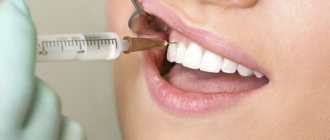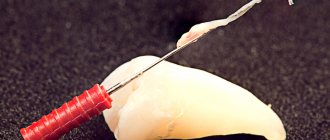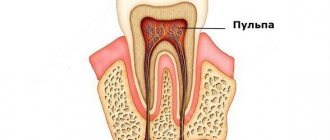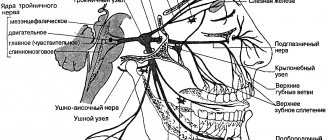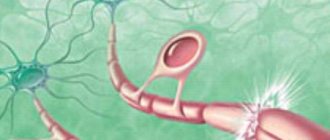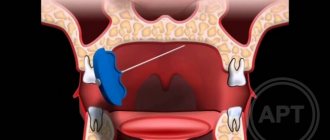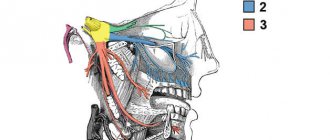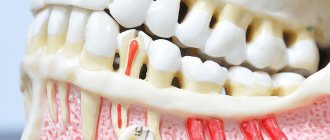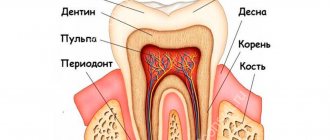We identify the causes of toothache
The unpleasant sensations associated with caries or gum inflammation are probably familiar to many. But do teeth hurt with neuralgia? It turns out that nerve endings can also become inflamed and cause aching, shooting or paroxysmal pain. The specific location of the three branches of the trigeminal nerve contributes to the spread of pain to the lower and upper jaw, as well as the upper part of the face.
If you have toothache, inflammation of the trigeminal nerve may be the root cause of these unpleasant sensations. At home, you can only assume the presence of such a disease. The final verdict on the cause of pain is made only by the dentist.
Going to the dentist is the best solution for this pathology
We tell you what to do if the nerve of the tooth is exposed. The doctor will help you get rid of not only painful symptoms, but also the problem itself that provokes them.
On a note! If you have an exposed tooth nerve, then before understanding how to treat, the doctor will use a visual examination and x-ray to determine the extent of the damage.
Conservative (biological) treatment method with pulp preservation
In case of an inflammatory process that has slightly affected the pulp, and in the absence of negative changes in the periodontal tissues, conservative therapy with preservation of the nerve is possible. In this case, the specialist will simply clean the root canals and put medications with calcium hydroxide inside and install a temporary filling. Next, dynamic observation is carried out. In case of positive dynamics, the temporary filling is replaced with a permanent one. From the first visit to the clinic to the final one it can take from several weeks to 6 months.
Surgical methods
In most cases, the pulp is severely inflamed because it has time to be exposed to harmful bacteria while you are wondering whether to go to the doctor or wait a little and be patient. In this case, the specialist, as a rule, decides to remove it partially (vital amputation) or completely (extirpation).
Most often, the nerve is completely removed. But the procedure for killing it and removing it from the tooth cavity can be carried out in different ways. The most modern - vital extirpation, that is, the living pulp is removed - is performed in one visit to the dental office, under local anesthesia, using special tools - files and pulp extractors.
However, many clinics still practice treatment in two stages. If a tooth hurts or a nerve is exposed, this is what the doctor will do:
- at the first stage: the specialist drills out hard tissues, opens access to the root canals, puts a special devitalizing paste inside and closes the cavity with a temporary filling. Some pastes contain arsenic, but they are less toxic and safer than those used previously, and also contain lidocaine for pain relief and antiseptics. Killing of the pulp usually occurs within 1-3 days. Also today, in some clinics, arsenic-free formulations are used for these purposes, which are considered even safer - these can remain in the mouth for up to 10 days,
- at the second appointment: the temporary filling and paste are removed, the dead pulp is removed, the tissues and canals are well cleaned, and a permanent filling is placed. X-ray control is required, with the help of which the doctor can evaluate the quality of the work done and make sure that the pulp is completely removed.
“I faced unbearable pain due to an exposed nerve. The pills did not help relieve the pain at all. The clinic immediately offered to remove the pulp and then put a crown on top. Otherwise, they said, the tooth will not last long in this condition. They removed the pulp in one sitting, immediately put on a temporary crown, and 2 weeks later - a permanent one.”
Ris, review from yell.ru
The main symptoms of inflammation of the ternary nerve
What are the main symptoms of trigeminal nerve inflammation and tooth pain? The location of the pain and its nature will depend on which nerve endings are inflamed. If it is the lower trigeminal nerve, then discomfort will be felt in the lower jaw. With inflammation of the middle trigeminal nerve - in the upper jaw. Inflammation of the superior trigeminal nerve causes pain to spread to the upper part of the face (eyes, forehead, temples and even ears).
With neuralgia, teeth can hurt either constantly or periodically (paroxysmal pain). Unpleasant sensations can begin suddenly and end just as unexpectedly. Sometimes it can be very difficult to identify the exact location of pain.
How do teeth hurt with trigeminal neuralgia? Discomfort can manifest itself as ordinary toothache or migraine. But, characteristically, this pathology never causes edema.
What is pulp?
The pulp, or dental nerve, is a bundle of nerve endings and capillaries in the internal cavity of the tooth. It is protected from external irritants and infection by the tissue that is located in the root and crown.
After removal of the nerve, the blood supply and mineralization of the tooth deteriorate significantly. In addition, its sensitivity decreases, the enamel becomes dull and weakens. In other words, pulp removal negatively affects the structure and strength of the tooth, but makes it possible to preserve it.
Indications for the procedure:
- exposure of the nerve as a result of tooth trauma and damage to the crown;
- consequences of improper dental treatment;
- the presence of caries-affected tissues;
- preparation for prosthetics;
- chronic inflammation of the pulp (pulpitis);
- inflammation of the root membrane of the tooth (periodontitis);
- low placement of crowns;
- extensive pulp area;
- bactericidal infection of the apex of the tooth root.
How is trigeminal nerve inflammation diagnosed?
If you only feel aching pain in your teeth, then first you need to make an appointment at a dental clinic. Only a competent dentist can determine the nature of the pain, its cause and the exact source. Typically, an examination of the oral cavity is performed, followed by palpation and tapping of painful areas. To accurately verify the neuralgic nature of the disease, you will need to undergo a CT scan of the teeth (this will show the presence of inflammatory processes in the teeth and gums, and will also allow you to detect abscesses and other pathologies). You may need to consult an ENT specialist, since problems with the maxillary sinuses may also cause pain. Well, if you experience characteristic shooting pains, you should immediately contact a neurologist.
Once the presence of tertiary nerve inflammation is confirmed, the doctor decides how to treat the patient. You should not hope that the pain will go away on its own. These cases are extremely rare; moreover, it is important to determine the true cause of the discomfort and exclude other more dangerous and serious pathologies.
How to kill the pulp in dentistry
A dental procedure is performed under anesthesia, regardless of the nature and scope of the work. The specialist knows why there are nerves in teeth, so he selects an anesthetic taking into account the anatomical features, the patient’s possible allergic reaction and individual wishes. The depulpation process is as follows:
- Removal of dentin and enamel with anesthesia. The procedure is carried out using air cooling technology.
- Placing a special paste that allows you to kill the nerve of the tooth, both the canine and the molar. Today, modern pastes are used to devitalize nerve endings.
- Installation of a temporary filling.
- Removal of temporary filling, opening of the pulp chamber, extraction of nerve endings.
- Canal cleaning, disinfection, filling.
At the final stage, a control x-ray is taken, where the patient and the doctor can see how the canals were sealed. After the procedure, the question may arise about how to relieve toothache even though the nerve has already been removed. For this you can use drugs such as Ibuprofen, Pentalgin, Nimesil. It is recommended to use only those products prescribed by the dentist. After treatment for pulpitis, pain may be observed for a week.
How is inflammation of the trigeminal nerve treated?
Correct treatment for inflammation of the trigeminal nerve can only be prescribed by a neurologist. Depending on the complexity of inflammation, the following agents are included in therapy:
- Drugs to combat symptoms (pain);
- Antispasmodics and muscle relaxants of central action;
- Alcohol blockades (for severe inflammation);
- Metabolic drugs;
- Anticonvulsants (carbamazepine, finlepsin);
- B vitamins;
- Physiotherapeutic procedures.
The measures are aimed at relieving inflammation and completely eliminating pain symptoms. Properly prescribed treatment for inflammation of the trigeminal nerve can not only restore excellent health, but also prevent relapses.
This information is for informational purposes only. Only a professional specialist can prescribe treatment after examination and diagnosis.
What diseases cause inflammation of dental canals?
Root canals can become inflamed due to the development of the following diseases:
- caries;
- pulpitis;
- periodontitis.
An accurate diagnosis of inflammation of the pulp and canals of the tooth can only be determined by a dentist after X-ray diagnostics and a visual examination of the oral cavity.
Tooth weakening - after nerve removal
Because the tooth structure is slightly weakened after root canal treatment, the tooth loses some of its original capabilities. This translates into a higher risk of tooth fractures. Those patients who have had root canal treatment should avoid eating hard foods, such as nuts, or using other teeth to chew on them. To avoid the risk of tooth fracture after root canal treatment, you should consider installing a dental crown.
Failed root canal treatment
Root canal treatment may fail in approximately 5% of patients. This often leads to tooth extraction. Such cases occur for various reasons, sometimes even independent of the quality of canal filling.
Why do baby teeth sometimes have to be removed?
As was written above, most often such teeth can be removed without resorting to professional help. However, sometimes there is still a need to visit the dental office. Before we look at the reasons why you have to seek help from dentists, let's talk about the location of the dental nerve. It is located quite deep in the tissues. The enamel provides it with reliable protection from external influences.
Why does the body need to protect the dental nerves? This can be explained quite simply:
- nerve endings that are located in the pulp must always be sterile. After all, they have a connection with the general blood flow;
- Temperature changes, acids, alkalis negatively affect dental nerves. If they are exposed, the person begins to feel unbearable pain. Therefore, to relieve a person from pain, it is necessary to protect the nerves well;
- a tooth can perform its assigned functions only if the pulp is not affected by external factors.
From the above we can conclude that any violation of the integrity of dentin can lead to the removal of nerves. But is it possible to remove the nerve in a baby tooth? Will this have negative consequences? Removing the nerve is a safe and sometimes necessary procedure. The most common reasons for removing nerves from teeth are:
- >pulpitis – is an inflammatory process that occurs in the pulp tissues;
- caries (deep) – thin enamel is not able to fully protect the tooth from the negative effects of harmful microorganisms. This is why the carious process quickly affects the tooth and spreads almost instantly;
- periodontitis - quite often children, afraid of a visit to the hospital, hide from their parents that the tooth hurts. Gradually, such neglect turns into a disease. Periodontitis develops, which occurs at the junction of the tooth and gum;
- Tooth trauma – trauma can cause damage to the enamel. In the future, this becomes the reason for removing the nerve.

